Narrative Writing:
Imaginary Friend Writing Sample
The Bunk Bed Narrative Writing Sample
The Slide Realistic Fiction Writing Sample
Expository Writing:
Bikes Informational Writing Sample
Apple Picking Informational Writing Sample
Cape Cod Informational Writing Sample
Persuasive Writing:
Horrible Harry Opinion Writing Sample
Poetry:
Letters:
Dear Principal Opinion Writing
Dear Litterers Opinion Writing Sample
Uncategorized:
Self Checklist:
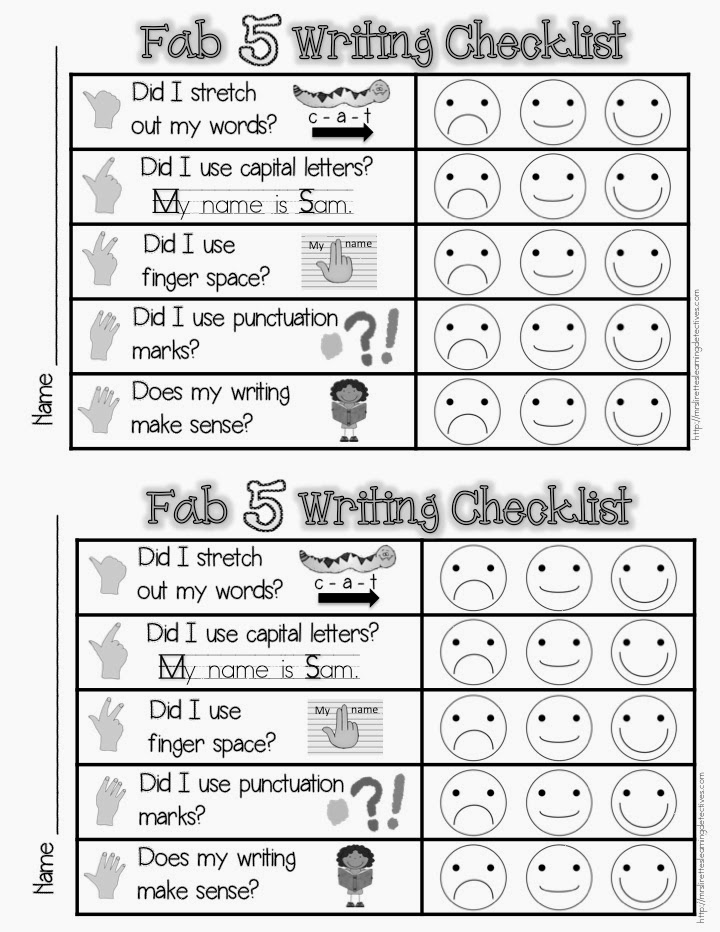
Self-Reflection Sheets:


Teacher Evaluation forms:
Pre-Writing:
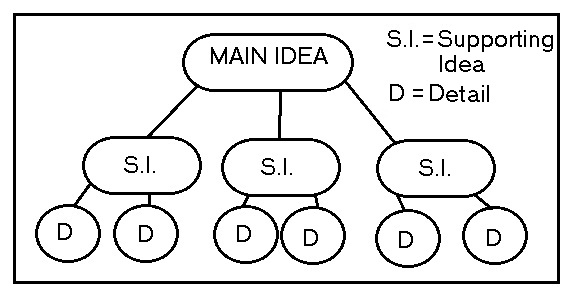
http://www.gallaudet.edu/Images/Academic/CLAST/EnglishWorks/mapping1_enlarge.jpg
Draft:

http://images.slideplayer.com/12/3435484/slides/slide_22.jpg (Links to an external site.)
Editing/Revising:
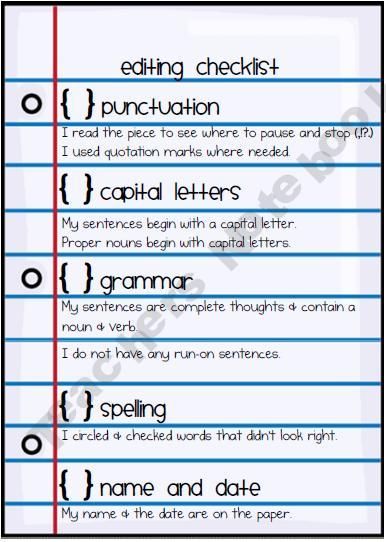
lessonplansandlattes.blogspot.com
Publishing:
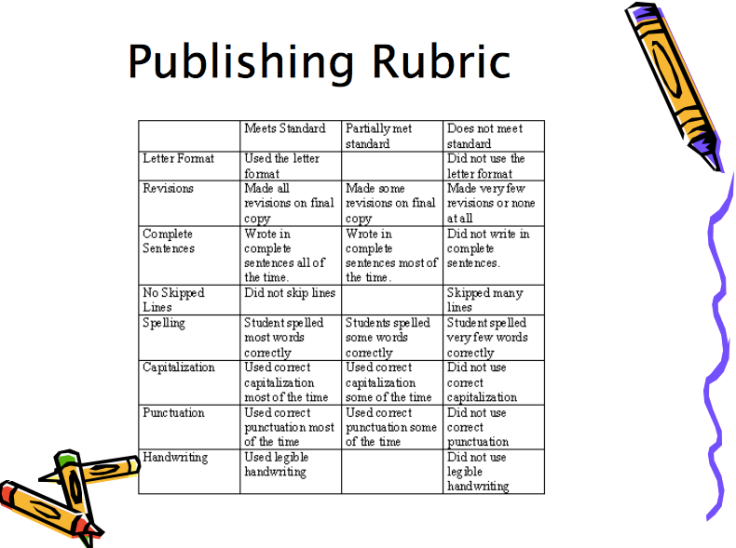
http://slideplayer.com/slide/3435484/ (Links to an external site.)
Writing Process Rubric:
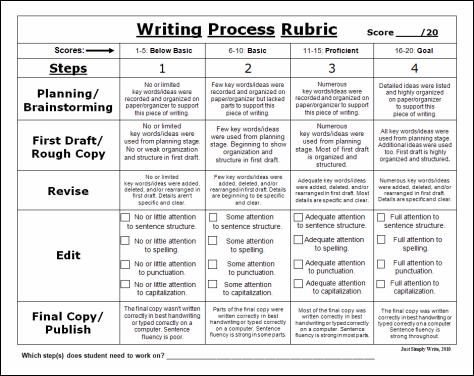
Conferencing:
Teacher resource:
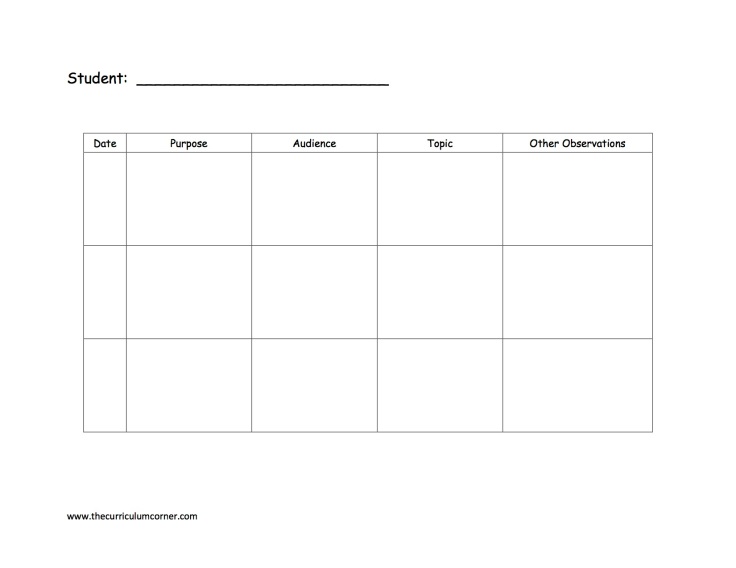
Click to access patconference.pdf
Student resource:
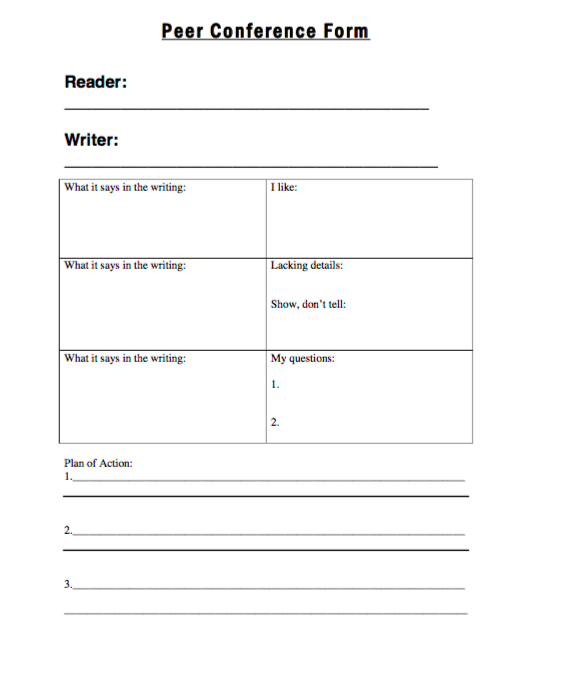
Click to access Peer+Conference+Form+and+Student+Samples.PDF
Topics to Write About:
Student resource listed first
Teacher resource listed second
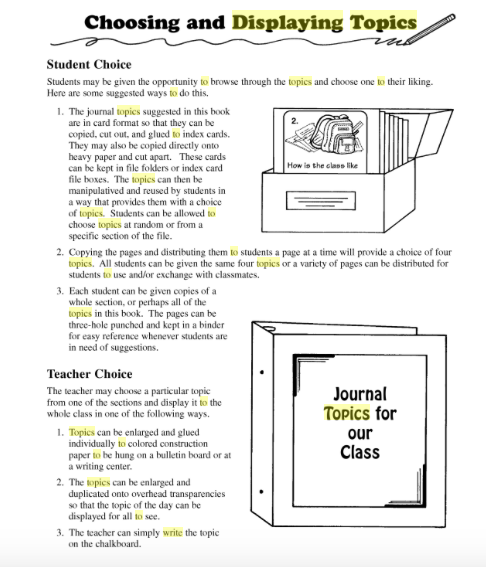
Jump into Journals (1996) byJoyce Granger page 5
Topics Written About:
Teacher resource:

Student resource:
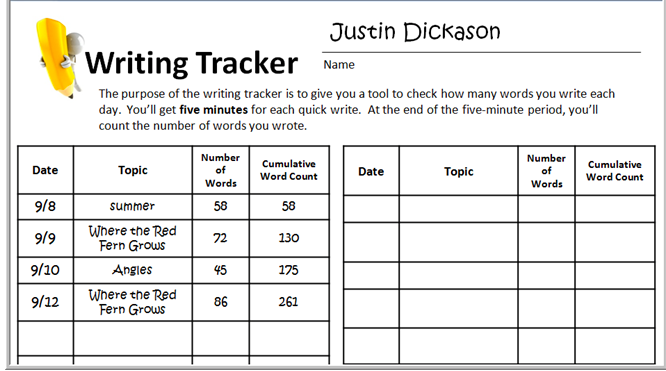
https://datadeb.wordpress.com/2010/08/14/quick-writes/ (Links to an external site.)
Skills Practiced:
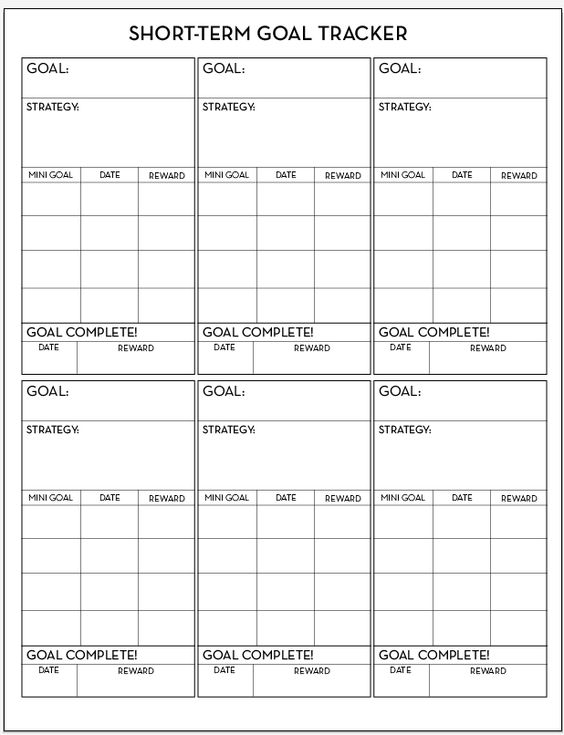
Expectations:
- Write about things that interest you and matter to you
- Make your own decisions to what is and is not working
- When conferencing with peers: listen, ask questions, and comment on their writing in ways that help them move forward.
- Be respectful of one another.
- Use information from mini-lessons to guide your writing
- Recognize that good writers build on their writing
- Work on writing at least 30 minutes a week outside of class
- All writing will be kept in student portfolio to show progress
- Recognize that reader’s eyes and minds need to understand and be able to read your writing.
- Expand your vocabulary as a writer
- Work hard in Writer’s Workshop
- HAVE FUN
Key Expectations:
- Respect one another
- Use time effectively
- Conferencing should be done in a whispering manner
- Do your best and work hard
- Stay positive
- Ideas:
- Binoculars to see detail in writing (Topic Idea)
- Ideas are a squiggle and can come from anywhere (Topic Idea)
- Organization:
- Sequencing based on alphabet (Topic Idea)
- Voice:
- Changing voices through different characters (Topic Idea)
- Word Choice:
- Convincing audience your point of view (Topic Idea)
- Word Choice as onomatopoeia (Topic Idea)
- Sentence Fluency:
- Using rhythm, pattern, and cadence in writing to engage audience (Topic Idea)
- Conventions:
- importance of punctuation and what reading is like without it. (Topic Idea)
Day 1: First day of Writer’s Workshop
- Lesson: Begin lesson by posing the question “what is an author?”. Have the students turn and talk for 30 seconds on this question, and then come back as a whole class. As a whole class discuss what was mentioned and jot down a few things that students say on the board. Then have the students think about things that are included within a book, and what they notice an author does in one. Write down things that are mentioned on the board (title, picture on the cover, design of pages, etc.). Explain to students that this year they will be authors in the classroom. Authors can write short pieces and long pieces, and every piece written will be a work of them as an author and will be “published”.
Start a model of the procedure students will follow as authors within the writer’s workshop. I will begin a story of my own, since young students write best when it is about themselves, I will write a story about something that has happened to me. As I am writing, I will think aloud my thoughts so students can understand my thinking through my writing. After writing a short portion of my story, I will instruct that the students will be doing what I did today during their writing time. - Formative assessment: While playing “Where are You Now” by Justin Bieber the students will complete an emoji formative assessment:
 When they complete the assessment, they will hand the paper to me and begin their writing. Through the writing time, I will conference first with the students who answered the thumbs down on the formative assessment.
When they complete the assessment, they will hand the paper to me and begin their writing. Through the writing time, I will conference first with the students who answered the thumbs down on the formative assessment. - Writing time: During this time the students will be writing about something that has happened to them. It could be anything that has happened to them in their life. As the students are writing, I am conferencing with students. In my conferences, I will ask students that have a good grasp on the idea of the workshop if they would like to share their writing with the class.
- Share: The students that I talked with previously will share their writing with the class. Since this is just the first day of doing the writer’s workshop, we will share as a class and make our comments and feedback as a class rather than in partners. This models how the students will be doing this portion of the writer’s workshop when they are with partners or small groups.
- Lesson Plan Resource
Day 2: Introduction to the trait idea
- Lesson: Introduce the first trait of idea through a powerpoint. Explain that ideas can be thoughts, facts, opinions, or details. Also explain that ideas answer the questions: who, what, when, where, why, and how. Tell students that details are additional ideas that tell more about a topic, and that good writers and authors give lots of detail to support their writing. Go over an example sentence, and ask the students if there are enough details to support the idea in the sentence. Students may notice that there isn’t much detail given, show them another writing sample. Ask students again if there is enough detail this time. Highlight the areas in the sample of where detail is given. Explain that details can be given through the senses: sight, smell, touch, taste, and sound.
(powerpoint gotten from the voice section) - Formative assessment: Since I am using technology to introduce the topic, the students will use their iPods through a mimeo to do a self reflection on how they feel about the trait.
- Writing time: Students will brainstorm and fill out a template worksheet that requires them to answer who, what, when, where, why, how, sight, smell, touch, taste, and sound. They will develop their answers through what they wrote about yesterday.
- Share: Students will share with their small groups what they completed and they will give each other feedback.
Day 3: Unique Imaginary Friends
- Lesson: Begin lesson through a read aloud of Ted by Tony DiTerlizzi. This story is about a unique imaginary friend named Ted and the adventures he has with a lonely boy. As I’m reading the book, I will pause and ask the students what they think the author did well. Take time to ask the students about the details that support the idea in the story and how the images support the idea as well. When I finish the book, as a class we will discuss the many adventures that Ted had. I will then have the students turn and talk about an adventure that they may have had with a friend. After 30 seconds, we will return to whole class and I will share a funny adventure that I had when I was a kid with a friend. After a couple of students share, I will explain how fun it would be to have an imaginary friend to take credit for a crazy adventure.
- Formative assessment: I will have a class discussion with the students on how this trait and how they feel. I will ask the students to hold up their hands showing 1-4 fingers on how they feel about today. 1 being I am lost, 2 being this makes sense, 3 being I understand, and 4 being I feel confident about this information.
- Writing time: The students will be thinking about something they did that was funny when they were younger, and how an imaginary friend could make the event even funnier or more adventurous because there would be someone to blame or draw inspiration from. They will be beginning their writing about an imaginary or real adventure they had with an imaginary friend like Ted in the story tomorrow, and today they are pre-writing.
ted_pre_write_and_drafting_sheet - Share: The students will share their pre-writing with their partner. The students will be mostly giving feedback on the ideas within their story and the details that support their ideas. They will be beginning writing this story tomorrow incorporating their peers feedback on their pre-writes.
Day 4: Continue Imaginary Friends writing.
- Lesson:Tell students that binoculars can help you see the details in things that are far away. When we write we can use questions and, like binoculars, the questions we ask can help us add more detail to our writing.
Begin by posting a very vague story that you have written.
For Example: “I have a dog. He is funny.”
Have students ask you questions about your story. Hopefully, they will ask questions such as: What’s your dog’s name? How long have you had your dog? What does he look like? What does he do that is funny?
List their questions at the bottom of your piece of writing. After they are finished asking the questions, model for students as you rewrite your piece to include the answers to the questions they asked.
Have your students reread their own stories and give you any pieces they would like to use binoculars on. You can use these pieces for future mini-lessons. Put the students’ work on an overhead transparency and record the questions. Be sure to share the rewritten versions as a future mini-lesson and compare the two pieces of writing. Ask them which gives them a clearer “picture”. - Formative assessment: Go around the room and have students tell their adventure that they are having with their imaginary friend in their writing.
- Writing time: Students will be using their pre-writing and their feedback to begin their drafts to their imaginary friend adventure story. I will conference with students on their ideas and the development of ideas they have in their story.
- Share: Students will peer conference in order to go into the editing stage of the writing process.
- Binoculars Lesson Plan Resource
Day 5: Publishing our Ideas paper
- Lesson: I will do a read aloud of the book Owl Moon by Jane Yolen, as we have been learning what to look for in writing throughout the week. We will be do the binoculars on the ideas in this book, and we will also point out the details and the sensory details that the author used.
- Formative assessment: The formative assessment will be done through the writing time asking each individual student how their writing is going and supporting them as they make their edits for publishing.
- Writing time: Students edit their paper according to their peer conference from yesterday. They will be finishing their writing today to publish during the share time. I will be conferencing with students as the rest of the class is writing.
- Share: Students will share their imaginary friend adventures with the class.
Day 1: First day of School
- I will set my exceptions and explain them to the students. Throughout the day we will model the exceptions.
- Students will be doing a variety of community building and getting to know each other activities.
- Read aloud of “How I Spent my Summer Vacation”
Day 2:
- Continuing exception modeling for the various expectations that are within the classroom.
- Set Writer’s Workshop Expectations, explain the schedule time and the places around the room that the workshop will take place.
- Explain their student portfolios and how their writings will be kept in them throughout the year.
Day 3:
- Read aloud book about the writing process.
- Go over the steps within the writing process through an anchor chart and show what each step looks like.
Day 4:
- Discuss why writers write and ask students what they think is important in writing.
- Introduce the 6+1 Traits of Writing and how they will be taught during the writer’s workshop.
Day 5:
- First day of Writer’s workshop
- What is an author mini-lesson and teacher modeling
- Student’s write on given topic
- http://www.thecurriculumcorner.com/wp-content/pdf/process1.pdf


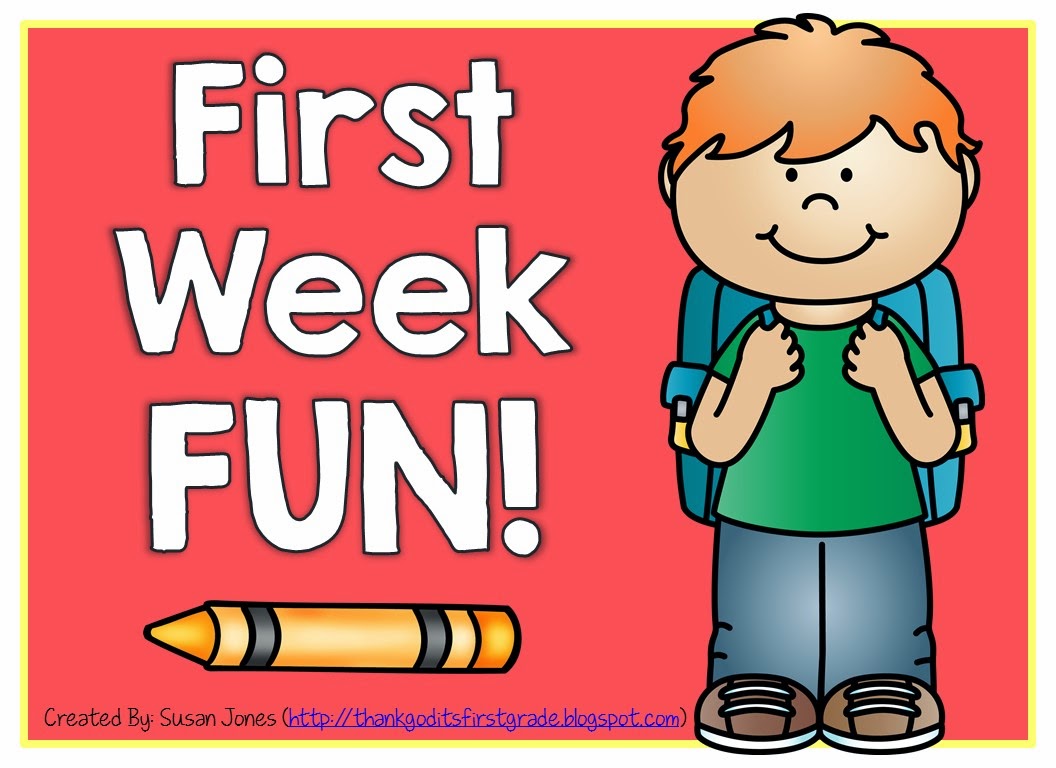
Recent Comments